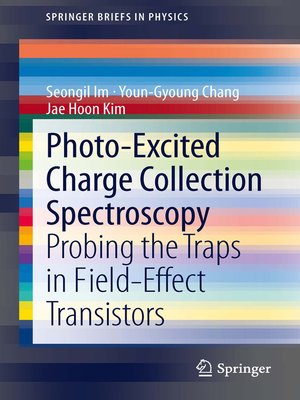Photo-Excited Charge Collection Spectroscopy
ebook ∣ Probing the traps in field-effect transistors · SpringerBriefs in Physics
By Seongil Im

Sign up to save your library
With an OverDrive account, you can save your favorite libraries for at-a-glance information about availability. Find out more about OverDrive accounts.
Find this title in Libby, the library reading app by OverDrive.



Search for a digital library with this title
Title found at these libraries:
| Library Name | Distance |
|---|---|
| Loading... |
Solid state field-effect devices such as organic and inorganic-channel thin-film transistors (TFTs) have been expected to promote advances in display and sensor electronics. The operational stabilities of such TFTs are thus important, strongly depending on the nature and density of charge traps present at the channel/dielectric interface or in the thin-film channel itself.
This book contains how to characterize these traps, starting from the device physics of field-effect transistor (FET). Unlike conventional analysis techniques which are away from well-resolving spectral results, newly-introduced photo-excited charge-collection spectroscopy (PECCS) utilizes the photo-induced threshold voltage response from any type of working transistor devices with organic-, inorganic-, and even nano-channels, directly probing on the traps. So, our technique PECCS has been discussed through more than ten refereed-journal papers in the fields of device electronics, applied physics, applied chemistry, nano-devices and materials science, finally finding a need to be summarized with several chapters in a short book. Device physics and instrumentations of PECCS are well addressed respectively, in the first and second chapters, for the next chapters addressing real applications to organic, oxide, and nanostructured FETs. This book would provide benefits since its contents are not only educational and basic principle-supportive but also applicable and in-house operational.







